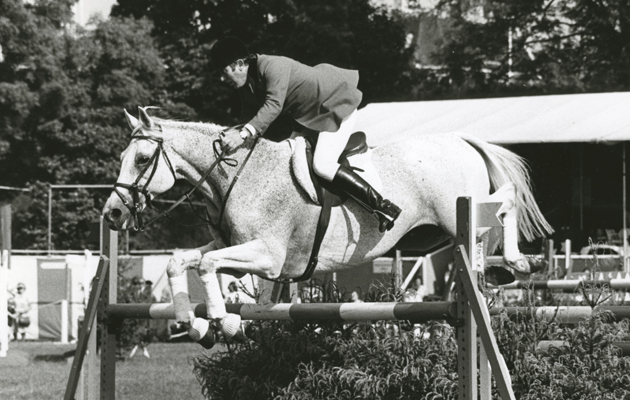Mark Phillips has nailed a host of roles within the eventing world, and his prowess as a rider puts him among the greats. Lucy Higginson discovers the history behind his remarkable career
Every Horse & Hound reader knows Captain Mark Phillips; he may even have been writing his H&H column longer than you’ve been around to read it. To the layman, he’s a horseman who married the Princess Royal, but to riders he’ll always be one of the greats: a four-time Badminton winner and Olympic gold medallist; a prolific team trainer (for the Spanish and Americans); then a world-class course-designer in the current phase of his career.
In his best-selling book Outliers: The Story of Success , Malcolm Gladwell explores the idea that genius doesn’t just pop up randomly. It emerges when someone with huge potential meets with opportunity to learn, absorb, practise and practise again until they achieve that “genius” status.
{"content":"PHA+V2hlbiB5b3UgZGlzY292ZXIgdGhhdCBNYXJrIGpvaW5lZCBoaXMgbG9jYWwgUG9ueSBDbHViIGJyYW5jaCAoZW5jb3VyYWdlZCBieSBoaXMgaG9yc2V5IG1vdGhlciBBbm5lKSB0byByaWRlIGFsb25nc2lkZSBhIHlvdW5nIEphbmUgQnVsbGVuIChsYXRlciBIb2xkZXJuZXNzLVJvZGRhbSksIEplbm5pZSBCdWxsZW4gKGxhdGVyIExvcmlzdG9uLUNsYXJrZSkgYW5kIGZ1dHVyZSB0b3AtbGV2ZWwgZXZlbnRlciB0dXJuZWQgY29tbWVudGF0b3IgTWlrZSBUdWNrZXIsIHlvdSByZWFsaXNlIHRoaXMgd2FzIG5vIG9yZGluYXJ5IGVwb2NoIGluIHRoZSBCZWF1Zm9ydCBicmFuY2ggb2YgdGhlIFBvbnkgQ2x1Yi4gQW5kIE1hcmsgd2FzIGRlc3RpbmVkIHRvIGJlY29tZSBubyBvcmRpbmFyeSByaWRlci48L3A+CjxwPlRoZSBicmFuY2ggaW5zdHJ1Y3RvcnMgd2VyZSBlcXVhbGx5IG1pbmQtYm9nZ2xpbmcuIE1hcmsgcmVtZW1iZXJzIHRyb3R0aW5nIDIwLW1ldHJlIGNpcmNsZXMgdW5kZXIgdGhlIHdhdGNoZnVsIGV5ZSBvZiBNb2xseSBTaXZld3JpZ2h0LCBmb3VuZGVyIG9mIFRhbGxhbmQgU2Nob29sIG9mIEVxdWl0YXRpb247IGJlaW5nIHRyYWluZWQgYnkgQ29sb25lbCBBbGVjIFNjb3R0LCB3aG\/igJlkIHdvbiB0ZWFtIGJyb256ZSBpbiB0aGUgMTkzNiBCZXJsaW4gT2x5bXBpY3MsIHRoZW4gTGlldXRlbmFudC1Db2xvbmVsIEZyYW5rIFdlbGRvbiAodGVhbSBnb2xkIG1lZGFsbGlzdCBmcm9tIHRoZSAxOTU2IFN0b2NraG9sbSBPbHltcGljcyBhbmQgbGF0ZXIgY291cnNlLWRlc2lnbmVyIGF0IEJhZG1pbnRvbiksIOKAnGFjdHVhbGx5IHNpdHRpbmcgb24gaGlzIEJyaXRpc2ggdGVhbSBob3JzZSwgd2hvbSBoZeKAmWQgcmlkZGVuIGF0IFJvbWUgW09seW1waWNzXSDigJMgdGFsayBhYm91dCBpbnNwaXJhdGlvbiHigJ08L3A+CjxwPkJ1dCBNYXJr4oCZcyBiaWdnZXN0IGVhcmx5IGluZmx1ZW5jZSBieSBmYXIgd2FzIGFub3RoZXIgZnJvbSB0aGF0IFN0b2NraG9sbSB0ZWFtLCBCZXJ0aWUgSGlsbC48L3A+CjxwPjxkaXYgY2xhc3M9ImFkLWNvbnRhaW5lciBhZC1jb250YWluZXItLW1vYmlsZSI+PGRpdiBpZD0icG9zdC1pbmxpbmUtMiIgY2xhc3M9ImlwYy1hZHZlcnQiPjwvZGl2PjwvZGl2PjxzZWN0aW9uIGlkPSJlbWJlZF9jb2RlLTMxIiBjbGFzcz0iaGlkZGVuLW1kIGhpZGRlbi1sZyBzLWNvbnRhaW5lciBzdGlja3ktYW5jaG9yIGhpZGUtd2lkZ2V0LXRpdGxlIHdpZGdldF9lbWJlZF9jb2RlIHByZW1pdW1faW5saW5lXzIiPjxzZWN0aW9uIGNsYXNzPSJzLWNvbnRhaW5lciBsaXN0aW5nLS1zaW5nbGUgbGlzdGluZy0tc2luZ2xlLXNoYXJldGhyb3VnaCBpbWFnZS1hc3BlY3QtbGFuZHNjYXBlIGRlZmF1bHQgc2hhcmV0aHJvdWdoLWFkIHNoYXJldGhyb3VnaC1hZC1oaWRkZW4iPg0KICA8ZGl2IGNsYXNzPSJzLWNvbnRhaW5lcl9faW5uZXIiPg0KICAgIDx1bD4NCiAgICAgIDxsaSBpZD0ibmF0aXZlLWNvbnRlbnQtbW9iaWxlIiBjbGFzcz0ibGlzdGluZy1pdGVtIj4NCiAgICAgIDwvbGk+DQogICAgPC91bD4NCiAgPC9kaXY+DQo8L3NlY3Rpb24+PC9zZWN0aW9uPjwvcD4KPHA+4oCcRnJhbmsgV2VsZG9uIHNlbnQgbWUgdG8gQmVydGllIG9uIGEgc29ydCBvZiBnYXAgeWVhciBbYmVmb3JlIGpvaW5pbmcgdGhlIEFybXldLOKAnSBzYXlzIE1hcmsuIOKAnEhlIHdhcyBhIG5hdHVyYWwgaG9yc2VtYW4sIGxpa2UgTWFyayBUb2RkIOKAkyBhbmQgYmVjYW1lIG15IG1lbnRvci7igJ08L3A+CjxwPkJlcnRpZSB0b2xkIEFuZ2VsYSBSaXBwb24gZm9yIGhlciAxOTgyIGJpb2dyYXBoeSBvZiBNYXJrIHRoYXQgaGUg4oCcaGFkIGFsbCB0aGUgYWJpbGl0eSBpbiB0aGUgd29ybGTigKYgaXQgd2FzIGp1c3QgYSBtYXR0ZXIgb2YgYWRkaW5nIGEgYml0IG9mIHBvbGlzaOKAnS48L3A+CjxwPkhpcyBwdXBpbCBzcGVha3MgbW9yZSBwbGFpbmx5IGFib3V0IGl0IG5vdzog4oCcSSB0aG91Z2h0IEkga25ldyBob3cgdG8gcmlkZSDigJMgYnV0IG9uIG15IGZpcnN0IGRheSBhdCBCZXJ0aWXigJlzLCBoZSBzYWlkLCDigJhGb2xsb3cgbWUh4oCZIGFuZCB0b29rIG1lIGZsYXQgb3V0IGRvd24gRGV2b24gY2xlYXZlcyBhbmQgaGVhdmVuIG9ubHkga25vd3Mgd2hhdOKApiBJIHRob3VnaHQsIOKAmEhvbHkgcyoqdCHigJkgVGhhdCBjaGFuZ2VkIG1lIGZyb20gYSBQb255IENsdWIga2lkIGludG8gc29tZXRoaW5nIGVsc2Uu4oCdPC9wPgo8ZGl2IGNsYXNzPSJhZC1jb250YWluZXIgYWQtY29udGFpbmVyLS1tb2JpbGUiPjxkaXYgaWQ9InBvc3QtaW5saW5lLTMiIGNsYXNzPSJpcGMtYWR2ZXJ0Ij48L2Rpdj48L2Rpdj4KPHA+QmVydGllIGhlbHBlZCBhbiAxOC15ZWFyLW9sZCBNYXJrIHRvIHByb2R1Y2UgdGhlIGhvcnNlIHRoYXQgd291bGQgYmVjb21lIGhpcyBmaXJzdCBzZXJpb3VzIGV2ZW50ZXIsIFJvY2sgT24sIGZyb20gYSBmZWFybGVzcyBidXQgZnJpZ2h0ZW5pbmcgbm92aWNlIGludG8gYSBCdXJnaGxleSBob3JzZSBpbiB0aGUgc3BhY2Ugb2YgYSBzZWFzb24sIGFzIHlvdSBjb3VsZCBiYWNrIHRoZW4uIEZvdXJ0aCB0aGVyZSBmb2xsb3dlZCBieSBmb3VydGggYXQgQmFkbWludG9uIHJlc3VsdGVkIGluIE1hcmsgYmVjb21pbmcgdHJhdmVsbGluZyByZXNlcnZlLCBhZ2VkIDE5LCBmb3IgdGhlIGdvbGQgbWVkYWwtd2lubmluZyBCcml0aXNoIHRlYW0gaW4gTWV4aWNvIDE5NjguPC9wPgo8aDM+RGlzdGluY3RseSBhdmVyYWdlIGhvcnNlczwvaDM+CjxwPkluIG1hbnkgd2F5cywgdGhpcyBzZXQgdGhlIHRvbmUgZm9yIHNvIG11Y2ggaW4gTWFya+KAmXMgY2FyZWVyIOKAkyBwcm9kdWNpbmcgZmFudGFzdGljIHJlc3VsdHMgZnJvbSBzZWxmLW1hZGUgb3Igc29tZXRpbWVzIGRpc3RpbmN0bHkgYXZlcmFnZSBob3JzZXMg4oCTIHlldCB0b28gb2Z0ZW4gZW5kaW5nIHVwIG9uIHRoZSBwZXJpcGhlcmllcyB3aGVuIGl0IGNhbWUgdG8gT2x5bXBpY3MuIEJpemFycmVseSwgZm9yIHN1Y2ggYSBwcm9saWZpYyByaWRlciwgaGUgbmV2ZXIgd29uIGFuIGluZGl2aWR1YWwgY2hhbXBpb25zaGlwIG1lZGFsLjwvcD4KPGRpdiBjbGFzcz0iYWQtY29udGFpbmVyIGFkLWNvbnRhaW5lci0tbW9iaWxlIj48ZGl2IGlkPSJwb3N0LWlubGluZS00IiBjbGFzcz0iaXBjLWFkdmVydCI+PC9kaXY+PC9kaXY+CjxwPuKAnEkgd2FzIG5ldmVyIGluIHRoZSBwb3NpdGlvbiB0byBnbyBvdXQgYW5kIHNwZW5kIGJpZyBmaWd1cmVzIG9uIGhvcnNlcyzigJ0gc2F5cyBNYXJrLiDigJxJIGJvdWdodCBmb3VyLSwgZml2ZS0gb3Igc2l4LXllYXItb2xkcyBhbmQgb2NjYXNpb25hbGx5IGx1Y2tlZCBvdXQu4oCdPC9wPgo8cD5Gb3JtZXIgQmFkbWludG9uIGRpcmVjdG9yIGFuZCByaWRpbmcgY29udGVtcG9yYXJ5IEh1Z2ggVGhvbWFzIGFncmVlcyB0aGF0IE1hcmvigJlzIHN1Y2Nlc3Mg4oCcb24gYSBncmVhdCBtYW55IGRpZmZlcmVudCBob3JzZXMgYW5kIGNhdGNoIHJpZGVzIGlzIG9uZSBvZiB0aGUgdGhpbmdzIHRoYXQgbWFrZXMgaGltIHN0YW5kIG91dC4gSGlzIGdyZWF0ZXN0IGFjaGlldmVtZW50IEkgdGhpbmsgd2FzIHdpbm5pbmcgdHdvIEJhZG1pbnRvbnMgYW5kIGFuIE9seW1waWMgZ29sZCBvbiBHcmVhdCBPdmF0aW9uIHdobyB3YXMgbm90IHRoZSBtb3N0IGdlbmVyb3VzIG9mIGhvcnNlcy7igJ08L3A+CjxkaXYgY2xhc3M9ImFkLWNvbnRhaW5lciBhZC1jb250YWluZXItLW1vYmlsZSI+PGRpdiBpZD0icG9zdC1pbmxpbmUtNSIgY2xhc3M9ImlwYy1hZHZlcnQiPjwvZGl2PjwvZGl2Pgo8cD5MdWNpbmRhIEdyZWVuIGFncmVlczog4oCcSSBjb3VsZCB0ZWxsIGV2ZW4gdGhlbiB3aGF0IGEgYmFkIGhvcnNlIEdyZWF0IE92YXRpb24gd2FzLCBidXQgaGUganVzdCBsaWZ0ZWQgaGltIG92ZXIgZXZlcnkgZmVuY2XigKYgaGUganVzdCBtYWRlIGl0IGhhcHBlbi7igJ08L3A+CjxwPk1hcmsgYWx3YXlzIHdhcyBvcGVuIGFib3V0IEdyZWF0IE92YXRpb27igJlzIGxpbWl0YXRpb25zLiBIZSB3YXMgdGVycmlibGUgaW4gdGhlIGF1dHVtbjog4oCcT3V0IG9mIHRoZSBodW50aW5nIGZpZWxkLCBoZSB3YXMgYSB3aW5uZXIuIE91dCBvZiBhIGxvbmcgc3VtbWVyIG9uIGhhcmQgZ3JvdW5kLCBoZSB3YXMgYSBkb25rZXku4oCdPC9wPgo8cD5NYXJr4oCZcyAxOTczIEJ1cmdobGV5IHRyaXVtcGggd2l0aCBNYWlkIE1hcmlvbiDigJMgYW5vdGhlciBob3JzZSBzZW50IGhpcyB3YXkgYnkgQmVydGllIEhpbGwg4oCTIGlzIGFub3RoZXIgZXhhbXBsZSBvZiBza2lsbCBvdmVyIHNjb3BlLiBPciBhcyBNYXJrIHB1dHMgaXQgdG9kYXk6IOKAnEkgaGFkIHRvIGNhcnJ5IGhlciByb3VuZC7igJ08L3A+CjxwPllldCB3aGVuIE1hcmsgZmluYWxseSBnb3QgaGlzIGhhbmRzIG9uIGEgdHJ1bHkgYnJpbGxpYW50IHJpZGUg4oCTIENvbHVtYnVzLCBvd25lZCBieSBUaGUgUXVlZW4gd2l0aCB3aG9tIGhlIHdvbiBoaXMgdGhpcmQgQmFkbWludG9uIGluIDE5NzQg4oCTIHRoZWlyIHBhcnRuZXJzaGlwIHdhcyBiZXNldCB3aXRoIGluanVyeS48L3A+CjxwPkhlIGFsc28gc3BlYWtzIGFuaW1hdGVkbHkgYWJvdXQgaGlzIG1pZC0xOTcwcyBmb3JheSBpbnRvIHRoZSB3b3JsZCBvZiBzaG93anVtcGluZywgdGhhbmtzIHRvIG93bmVyIGFuZCBkZWFsZXIgVHJldm9yIEJhbmtzLiBUcmV2b3IgZXZlbiBsZXQgTWFyayBjb21wZXRlIGhpcyBmb3JtZXIgT2x5bXBpYyBob3JzZSBIaWRlYXdheSBvbiBzZXZlcmFsIHZpY3RvcmlvdXMgTmF0aW9ucyBDdXAgdGVhbXMsIGluY2x1ZGluZyBDYWxnYXJ5LjwvcD4KPHA+4oCcWW91IHRoaW5rIEJhZG1pbnRvbiBvciBCdXJnaGxleSBnaXZlcyB5b3UgYW4gYWRyZW5hbGluZSBydXNoIOKAkyB5b3UgdHJ5IGdvaW5nIGFnYWluc3QgdGhlIGNsb2NrIG92ZXIgMS42MG0s4oCdIGhlIHJlY2FsbHMuPC9wPgo8cD5UaGlzIHdhcyBhbm90aGVyIGVsZW1lbnQgaW4gd2hhdCBNYXJrIGNvbnNpZGVycyBoaXMg4oCccHJvYmFibHkgdW5pcXVl4oCdIGVxdWVzdHJpYW4gZWR1Y2F0aW9uLiBUaGUgc2hvd2p1bXBpbmcg4oCcbWFkZSBtZSBhIHdheSBiZXR0ZXIgcmlkZXIuIEkganVzdCB3aXNoIEnigJlkIGRvbmUgaXQgZWFybGllciBpbiBteSBjYXJlZXIg4oCTIEnigJlkIGhhdmUgd29uIGEgbG90IG1vcmUu4oCdPC9wPgo8cD5IZSBsZWFybnQgZnJvbSBvdGhlcnMgYWxvbmcgdGhlIHdheSB0b28sIGluY2x1ZGluZyBEaWNrIFN0aWx3ZWxsLCBGZXJkaSBFaWxiZXJnLCBCZXJ0IGRlIE7DqW1ldGh5LCBhbmQg4oCcYSBmYW50YXN0aWMgYW1vdW504oCdIGFib3V0IGRyZXNzYWdlIGZyb20gaGlzIHNlY29uZCB3aWZlLCBTYW5keS48L3A+CjxwPk1hcmvigJlzIGNhcmVlciBhbHNvIHNwYW5zIGV2ZW50aW5n4oCZcyBkZXZlbG9wbWVudCBmcm9tIGJlaW5nIGEgdHJ1bHkgYW1hdGV1ciBzcG9ydCDigJMgd2l0aCB0cmFpbmluZyBjcmFtbWVkIGFyb3VuZCB0aGUgQXJteSBhbmQgbGF0ZXIgZmFybWluZyDigJMgdG8gYSBmYXIgbW9yZSBwcm9mZXNzaW9uYWwgb25lLCB3aXRoIHJpZGVycyBmaW5hbGx5IGxhbmRpbmcgYmlnIHNwb25zb3JzaGlwIGNvbnRyYWN0cyBieSB0aGUgMTk4MHMuPC9wPgo8cD5UaG91Z2ggYSBodWdlbHkgZWZmZWN0aXZlIHJpZGVyIGFjcm9zcyBjb3VudHJ5LCB3aGF0IGVsc2UgbWFkZSBNYXJrIHN0YW5kIG91dD8g4oCcSGUgd2FzIHBhcnRpY3VsYXJseSBicmlsbGlhbnQgYXQgc3BlZWQs4oCdIHJlbWVtYmVycyBIdWdoIFRob21hcy4g4oCcV2UgZGlkbuKAmXQgcmlkZSB0byBtaW51dGUgbWFya2VycyBiYWNrIHRoZW4sIGJ1dCBoZSByb2RlIHRoZSB0aWdodGVzdCBsaW5lcywgcHJhY3RpY2FsbHkgYm9vdGluZyB0aGUgZmVuY2UgcG9zdHMgb3V0IHdpdGggaGlzIGxlZy7igJ08L3A+CjxwPuKAnE1vc3QgcGVvcGxlIHRoZW4gd2VyZW7igJl0IGdvb2Qgb24gdGhlIGZsYXQgYnV0IE1hcmsgaGFkIGZlZWws4oCdIGFkZHMgTHVjaW5kYSBHcmVlbiwg4oCcYW5kIGhlIGRlZmluaXRlbHkgbG9va2VkIHRoZSBwYXJ0IGluIGhpcyB1bmlmb3JtLuKAnTwvcD4KPHA+RGVzcGl0ZSBNYXJr4oCZcyBhcnJheSBvZiBtZWRhbHMgd2hlbiBpdCBjYW1lIHRvIE9seW1waWNzLCB0aGluZ3MgbmV2ZXIgcXVpdGUgd2VudCBoaXMgd2F5LiBFdmVuIHdpbm5pbmcgdGVhbSBnb2xkIGluIE11bmljaCwgaGUgd2FzIHRoZSBkaXNjYXJkIHNjb3JlIG9uIEdyZWF0IE92YXRpb24gYW5kIHdhcyBndXR0ZWQgb25seSB0byBiZSB0cmF2ZWxsaW5nIHJlc2VydmUgZm9yIHRoZSAxOTc2IEdhbWVzIGluIE1vbnRyZWFsLjwvcD4KPHA+SW4gMTk4MCwgdGhlIEJyaXRpc2ggYm95Y290dGVkIHRoZSBNb3Njb3cgT2x5bXBpY3MgYW5kIGhpcyByaWRlLCBMaW5jb2xuLCB3ZW50IGxhbWUgYXQgdGhlIGFsdGVybmF0aXZlIGV2ZW50IGF0IEZvbnRhaW5lYmxlYXUuIE1hcmsgbWFkZSB0aGUgQnJpdGlzaCB0ZWFtIGEgZmluYWwgdGltZSBpbiAxOTg4IGZvciBTZW91bCwgYnV0IENhcnRpZXIgdGllZCB1cCBvbiB0aGUgcm9hZHMgYW5kIHRyYWNrcy4gSXQgc2VlbXMgaG9ycmlibHkgdW5sdWNreS4g4oCcSSB3YXMs4oCdIGFncmVlcyBNYXJrLiDigJxJIHByb2JhYmx5IHdhbnRlZCBpdCB0b28gbXVjaC7igJ08L3A+CjxwPkRlc3BpdGUgaGlzIHJlcHV0YXRpb24gYXMgYSBjb2FjaCBhbmQgY291cnNlLWRlc2lnbmVyLCBpdOKAmXMgaGlzIHRpbWUgYXMgYSByaWRlciB0aGF0IE1hcmsgbG9va3MgYmFjayBvbiBtb3N0IGZvbmRseTog4oCcSWYgeW914oCZcmUgYSBjb21wZXRpdG9yLCB5b3XigJlyZSBhbHdheXMgYSBjb21wZXRpdG9yLOKAnSBoZSByZWFzb25zLiDigJxJIGhhZCBzdWNoIGEgZ29vZCB0aW1lIHJpZGluZy4gSeKAmXZlIGJlZW4gZXh0cmVtZWx5IGx1Y2t5IGFuZCBteSBob2JieSBiZWNhbWUgbXkgcHJvZmVzc2lvbi7igJ08L3A+CjxwPkFuZCB0aGUgdmVyeSBiZXN0IGRheXMgb2YgdGhhdCBleHRyYW9yZGluYXJ5IGNhcmVlcj8g4oCcVGhhdOKAmXMgcXVpdGUgc2ltcGxl4oCmIEkgZ3JldyB1cCBpbiB0aGUgQmVhdWZvcnQgUG9ueSBDbHViIGRyZWFtaW5nIG9mIG9uZSBkYXkgd2lubmluZyBhdCBCYWRtaW50b24sIHNvIHRoYXQgZmlyc3Qgd2luIOKAkyBvaCBteSBHb2Qh4oCdIHJlcGxpZXMgTWFyay4g4oCcQW5kIHNlZWluZyB0aGF0IGZsYWcgZ28gdXAgYXQgYW4gT2x5bXBpY3MsIHRoYXTigJlzIHVuYmVsaWV2YWJsZS4gQW5kIHRoZSBCcml0aXNoIHRlYW0gaGFzbuKAmXQgc2VlbiBpdCBzaW5jZSwgbmVhcmx5IDUwIHllYXJzIGxhdGVyIeKAnTwvcD4KPGgzPjxlbT48c3Ryb25nPk1hcmsgb24mIzgyMzA7PC9zdHJvbmc+PC9lbT48L2gzPgo8cD48c3Ryb25nPlphcmE6PC9zdHJvbmc+IOKAnEZ1bm5pbHkgZW5vdWdoLCBJ4oCZbSBxdWl0ZSByZWxheGVkIHdoZW4gWmFyYSBnb2VzIGNyb3NzLWNvdW50cnkgYmVjYXVzZSBzaGUgaGFzIGdvb2QgaW5zdGluY3RzLiBEcmVzc2FnZSwgSeKAmW0gbmVydm91cywgYnV0IHNob3dqdW1waW5nIEnigJlsbCBzd2VhdCBidWNrZXRzIGJlY2F1c2Ugc2hlIGRvZXNu4oCZdCBoYXZlIHRoYXQgc2FtZSBuYXR1cmFsIGluc3RpbmN0IGZvciBpdC7igJ08L3A+CjxwPjxzdHJvbmc+THVjazo8L3N0cm9uZz4g4oCcSeKAmW0gYSBncmVhdCBiZWxpZXZlciB0aGF0IHlvdSBtYWtlIHlvdXIgb3duIGx1Y2suIE1vc3QgdGltZXMg4oCYYmFkIGx1Y2vigJkgaXMgYmVjYXVzZSB5b3UgbWFkZSBhIGJhZCBtb3ZlLiBQZW9wbGUgdXNlZCB0byBzYXkgdG8gbWU6IOKAmFdoYXQgZG8geW91IGRvIGZvciB0aGUgQW1lcmljYW5zP+KAmSBhbmQgSeKAmWQgc2F5IOKAmE1vc3RseSwgSSBrZWVwIHRoZW0gaG9uZXN04oCmIE5vLCB5b3Ugd2VyZW7igJl0IHVubHVja3kgdGhlcmUsIHlvdSByb2RlIGEgY3JhcHB5IHR1cm4u4oCZ4oCdPC9wPgo8cD48c3Ryb25nPlJpZGluZyBwb3NpdGlvbjo8L3N0cm9uZz4g4oCcW0Zvcm1lciBzaG93anVtcGluZyB0cmFpbmVyXSBHZW9yZ2UgTW9ycmlzIHNheXMgaGXigJlzIGEgcG9zaXRpb24gZnJlYWs7IHdlbGwsIEkgYW0gdG9vLiBXaGF0ZXZlciB5b3UgaGF2ZSBpbiBsaWZlIHlvdSBoYXZlIHRvIHdvcmsgb24sIGFuZCBJIHVzZWQgdG8gYW5hbHlzZSBteSBwaG90b2dyYXBocyBhbmQgY2hlY2sgdGhlIGFuZ2xlcyB3ZXJlIGFzIHRoZXkgc2hvdWxkIGJlLuKAnTwvcD4KPGgzPjxlbT48c3Ryb25nPkZvdXIgaG9yc2VzIE1hcmsgd2lsbCBuZXZlciBmb3JnZXQmIzgyMzA7PC9zdHJvbmc+PC9lbT48L2gzPgo8cD48c3Ryb25nPkNoaWNhZ286PC9zdHJvbmc+IEJlcnRpZSBIaWxs4oCZcyBjbGFzc3kgZ3JleSBwYXJ0bmVyZWQgTWFyayB0byBoaXMgZmlyc3QgYW5kIG9ubHkgV29ybGQgQ2hhbXBpb25zaGlwIHRlYW0gdGl0bGUgaW4gMTk3MC4gSG9wZXMgb2YgZG9pbmcgbW9yZSB3aXRoIGhpbSB3ZXJlIHRod2FydGVkIHdoZW4gdGhlIGhvcnNlIHdhcyBldmVudHVhbGx5IHNvbGQgdG8gR2VybWFueS4g4oCcSGUgaGFkIGEgYmlnIGhlYWQsIGJ1dCBhIGxvdCBvZiBxdWFsaXR5IGFuZCBhIGJldHRlciB0ZW1wZXJhbWVudCB0aGFuIENvbHVtYnVzLCBhIG1vcmUgcHVzaC1idXR0b24gcmlkZSzigJ0gc2F5cyBNYXJrLjwvcD4KPHA+PHN0cm9uZz5Sb2NrIE9uOjwvc3Ryb25nPiDigJxSb2NrIE9uIHdhcyBhbWF6aW5nLiBIZSBtYWRlIG1lLCB0byBiZSBob25lc3Qs4oCdIHNheXMgTWFyay4g4oCcVXAgdW50aWwgdGhlbiBJ4oCZZCBqdXN0IHJpZGRlbiBmYW1pbHkgaHVudGVycyBhbmQgbXkgZmlyc3QgcmVhbCB0aG9yb3VnaGJyZWQgZW5kZWQgdXAgYmVpbmcgYSBzdXBlcnN0YXIu4oCdIFVuZGVyIEJlcnRpZSBIaWxs4oCZcyBndWlkYW5jZSwgdGhpcyByYXcsIHphbnkgYW5kIGJyaWxsaWFudCBqdW1wZXIgd2VudCBmcm9tIG5vdmljZSB0byBmb3VydGggYXQgQnVyZ2hsZXkgaW4gb25lIHNlYXNvbi4g4oCcV2Ugd2VyZSAzOHRoIG91dCBvZiA0MCBhZnRlciBkcmVzc2FnZSzigJ0gcG9pbnRzIG91dCBNYXJrLiDigJxJIGRpZG7igJl0IGtub3cgd2hhdCBJIHdhcyBkb2luZy4gQmVjYXVzZSBvZiBoaW0sIEkgZ290IHRvIGdvIHRvIE1leGljbyBbYXMgcmVzZXJ2ZV0gd2hpbGUgSSB3YXMgYXQgU2FuZGh1cnN0LCB0aGVuIHJvZGUgaGltIGF0IG15IGZpcnN0IEV1cm9wZWFucy4g4oCcVGhhdOKAmXMgd2h5IEkgZ290IHRoZSByaWRlIG9uIFtCZXJ0aWUgSGlsbOKAmXMgaG9yc2VdIENoaWNhZ28sIGFuZCB0aGUgcmVzdCBpcyBoaXN0b3J5LuKAnSBEb2VzIE1hcmsgd2lzaCBoZeKAmWQgaGFkIGhpbSBsYXRlciBpbiBoaXMgY2FyZWVyPyDigJxJIHdvdWxkbuKAmXQgaGF2ZSBiZWVuIGJyYXZlIGVub3VnaCB0byByaWRlIGhpbSBsYXRlciBvbiHigJ08L3A+CjxwPjxzdHJvbmc+SGlkZWF3YXk6PC9zdHJvbmc+IEZvcm1lcmx5IHRoZSBPbHltcGljIHJpZGUgb2YgTWlrZSBTYXl3ZWxsLCB0aGlzIHRvcCBqdW1wZXIgb3duZWQgYnkgVHJldm9yIEJhbmtzIGdhdmUgTWFyayBzb21lIG9mIGhpcyBiZXN0IHRocmlsbHMgaW4gdGhlIHNhZGRsZSwgaW5jbHVkaW5nIGZvdXIgTmF0aW9ucyBDdXAgdmljdG9yaWVzLCBmb3VydGggcGxhY2UgaW4gdGhlIEtpbmcgR2VvcmdlIFYgR29sZCBDdXAgYW5kIHNlY29uZCBpbiB0aGUgSGlja3N0ZWFkIERlcmJ5IFRyaWFsLjxiciAvPgrigJxUaGUgbW9zdCBmcmlnaHRlbmluZyB0aGluZyBJIGV2ZXIgZGlkIHdhcyB0dXJuaW5nIGhpbSBpbnRvIHRoZSA3ZnQgcHVpc3NhbmNlIHdhbGwgYXQgT2x5bXBpYSzigJ0gc2F5cyBNYXJrLjwvcD4KPHA+PHN0cm9uZz5DYXJ0aWVyOjwvc3Ryb25nPiBNYXJr4oCZcyBsYXN0IGludGVybmF0aW9uYWwgaG9yc2UgY2FtZSBmcm9tIGEgd29ya2luZyBodW50ZXIgYmFja2dyb3VuZDog4oCcSXQgd2FzIGVhc3kgdG8gZmFzdCB0cmFjayBoaW0gdXAgdGhyb3VnaCB0aGUgZ3JhZGVzLuKAnSBIYXZpbmcgZmluaXNoZWQgc2V2ZW50aCBhdCBMZXhpbmd0b24gaW4gMTk4NiBhbmQgMTJ0aCBhdCBMdWhtw7xobGVuIGluIDE5ODcsIHRoZSBwYWlyIHdlcmUgc2VsZWN0ZWQgZm9yIFNlb3VsLCBidXQgTWFya+KAmXMgT2x5bXBpYyBib2dleSBjb250aW51ZWQ6IGFmdGVyIHRvcnJlbnRpYWwgcmFpbiBkdXJpbmcgdGhlaXIgZHJlc3NhZ2UsIHRoZSBob3JzZSB0aWVkIHVwIG9uIHRoZSByb2FkcyBhbmQgdHJhY2tzLjwvcD4KPGgzPlRoZSBCYWRtaW50b24gdHJpbzwvaDM+CjxwPjxzdHJvbmc+Q29sdW1idXM6PC9zdHJvbmc+IOKAnFRoZSBiZXN0IGhvcnNlIEkgZXZlciByb2RlLOKAnSBzYXlzIE1hcmsgb2YgdGhlIDE3LjFoaCBncmV5IG93bmVkIGJ5IFRoZSBRdWVlbi4gSGUgY2FtZSB0byBNYXJrLCBiZWZvcmUgaGlzIGVuZ2FnZW1lbnQgdG8gUHJpbmNlc3MgQW5uZSwgd2hlbiBpdCBiZWNhbWUgY2xlYXIgaW4gMTk3MiB0aGF0IGhlIHdhcyB0b28gc3Ryb25nIGZvciBoZXIuIFRob3VnaCBpdCB0b29rIGEgd2hpbGUgZm9yIE1hcmsgdG8gZ2V0IHRvIGdyaXBzIHdpdGggdGhlIGhlYWRzdHJvbmcgaG9yc2Ug4oCTIHRoZXkgaGFkIHR3byBmYWxscyBhdCB0aGVpciBmaXJzdCBCYWRtaW50b24gaW4gMTk3MyDigJMgdGhlIGZvbGxvd2luZyB5ZWFyIHRoZXkgd29uIHdpdGggYSBkb3VibGUgY2xlYXIuIOKAnEhlIGRpZCBldmVyeXRoaW5nIOKAkyB3b24gQmFkbWludG9uLCBiaWcganVtcGluZyBjbGFzc2VzLCBldmVuIHRvb2sgbWUgcm91bmQgdGhlIEdyYW5kIE5hdGlvbmFsIGNvdXJzZSBbZm9yIGEgQkJDIGNoYWxsZW5nZSBhZ2FpbnN0IGZvcm1lciBqb2NrZXkgUmljaGFyZCBQaXRtYW5dLOKAnSBzYXlzIE1hcmsuIOKAnE9idmlvdXNseSBoZSBuZWVkZWQgYSB0aG91c2FuZCBoYWxmLWhhbHRzIGJlZm9yZSB0aGUgZHJlc3NhZ2UgYmVjYXVzZSBoZSB3YXMgdGhvcm91Z2hicmVkIGFuZCB3YW50ZWQgdG8gZ2FsbG9wIGFuZCBqdW1wLiBCdXQgd2l0aCBoaW0gSSBoYWQgYWxsIHRoZSBvcHRpb25zLuKAnTwvcD4KPHA+TWFya+KAmXMgc29tZXRpbWUgdGVhbS1tYXRlIEh1Z2ggVGhvbWFzIGFncmVlczog4oCcQ29sdW1idXMgd291bGQgaGF2ZSBzdG9vZCBvdXQgYXQgYW55IHRpbWUsIG5vdCBqdXN0IGluIGhpcyB0aW1lIOKAkyBoZSBjb3VsZCBnYWxsb3AgZm9yZXZlciBhbmQganVtcCBldmVyeXRoaW5nLuKAnTwvcD4KPHA+PHN0cm9uZz5HcmVhdCBPdmF0aW9uOjwvc3Ryb25nPiBJdCB3b3VsZCBiZSBpbXBvc3NpYmxlIG5vdCB0byBoaWdobGlnaHQgdGhlIGhvcnNlIHdobyB3b24gdHdvIEJhZG1pbnRvbnMgYmFjayB0byBiYWNrIGZvciBNYXJrIGFuZCBwYXJ0bmVyZWQgaGltIG9uIHRoZSBnb2xkIG1lZGFsLXdpbm5pbmcgT2x5bXBpYyB0ZWFtIGluIE11bmljaC4gWWV0IHRoaXMgc21hcnQgZ2VsZGluZywgY28tb3duZWQgYnkgTWFya+KAmXMgZXZlciBzdXBwb3J0aXZlIEF1bnQgRmxhdmlhLCB3YXMg4oCcYSB2ZXJ5IGF2ZXJhZ2UgaG9yc2XigJ0sIHNheXMgTWFyay4g4oCcT0ssIGhlIGRpZCBhIGdvb2QgZHJlc3NhZ2UgdGVzdCBhbmQgd2FzIHF1aXRlIGNhcmVmdWwgc2hvd2p1bXBpbmcsIGJ1dCBoZSB3YXMgY2hpY2tlbiBzKip0IGNyb3NzLWNvdW50cnkuIFlvdSBhbHdheXMgaGFkIHRvIHB1dCBoaW0gaW4gZGVlcCB0byBhIGZlbmNlLiBBbmQgYW55IHRpbWUgeW91IHRob3VnaHQgaGUgd2FzIGJldHRlciB0aGFuIGhlIHdhcywgaGUgd291bGQgZWl0aGVyIHN0b3Agb3IgZmFsbCBvdmVyLuKAnTwvcD4KPHA+4oCcSSB0b29rIGhpbSBodW50aW5nIG9uY2UgYW5kIGV2ZW4gdGhlbiBoZSB3YXNu4oCZdCB0aGF0IGdyZWF0LOKAnSBhZGRzIE1hcnkgTG93IChuw6llIEdvcmRvbi1XYXRzb24pLiDigJxIZSBuZXZlciByZWFsbHkgcGlja2VkIHVwIHRoZSBicmlkbGUu4oCdPC9wPgo8cD48c3Ryb25nPkxpbmNvbG46PC9zdHJvbmc+IEEgaG9yc2UgcmVtZW1iZXJlZCBsZXNzIGZvciBoaXMgdGFsZW50IHRoYW4gdGhlIGNoYWxsZW5nZSBoZSBwcmVzZW50ZWQgaGlzIHJpZGVyIHdpdGggYmVmb3JlIHdpbm5pbmcgTWFya+KAmXMgZm91cnRoIGFuZCBmaW5hbCBCYWRtaW50b24gaW4gMTk4MS4g4oCcTGluY29sbiB3YXMgYW5vdGhlciBtYWdpY2FsIHN0b3J5IGJlY2F1c2UgSSBzcGVudCAxOCBtb250aHMgdHJ5aW5nIHRvIGdldCBoaW0gdG8gZ28gbGlrZSBhIG5vcm1hbCBob3JzZSzigJ0gc2F5cyBNYXJrLiDigJxMaW5jb2xuIHdhbnRlZCB0byBzdG9ybSBpbnRvIGZlbmNlcyBhbmQgc2xvdyBkb3duIGF0IHRoZSBsYXN0IG1vbWVudCB3aGlsZSBJIHdhbnRlZCBoaW0gdG8gY29tZSBpbnRvIHRoZW0gaW4gYSByaHl0aG0uPC9wPgo8cD5JIHRvb2sgaGltIHRvIFRhdW50b24gVmFsZSBvbmUgZGF5IGFuZCBoYWQgMTcgc3RvcHMgb24gdGhlIGNyb3NzLWNvdW50cnkgdHJ5aW5nIHRvIGRvIGl0IG15IHdheSzigJ0gaGUgcmVtZW1iZXJzLiDigJxTbyBJIGdhdmUgdXAgYW5kIHJvZGUgaGltIGhpcyB3YXkgYW5kIGxldCBtZSB0ZWxsIHlvdSwgY29taW5nIGF0IDYwIG1ldHJlcyBhIG1pbnV0ZSBpbnRvIGEgY29mZmluIGZyaWdodGVucyB0aGUgbGlmZSBvdXQgb2YgeW91LuKAnTwvcD4KPGgzPk1hcmvigJlzIG1lZGFsczwvaDM+CjxwPjxlbT48c3Ryb25nPjE5NzAsIHRlYW0gZ29sZCwgV29ybGQgQ2hhbXBpb25zaGlwcywgUHVuY2hlc3Rvd248L3N0cm9uZz48L2VtPjxiciAvPgpNYXJrIHJvZGUgQmVydGllIEhpbGzigJlzIHNtYXJ0IGdyZXkgQ2hpY2FnbyBhbG9uZ3NpZGUgdGVhbS1tYXRlcyBSaWNoYXJkIE1lYWRlLCBNYXJ5IEdvcmRvbi1XYXRzb24gYW5kIFN0dWFydCBTdGV2ZW5zLiBEZXNwaXRlIE1hcmvigJlzIGNyaWNrZXQgc2NvcmUgbGF0ZSBvbiB0aGUgY291cnNlLCBoZSBmaW5pc2hlZCAxMXRoLiBCcml0YWluIHdhcyB0aGUgb25seSB0ZWFtIHRvIGdldCB0aHJlZSBob21lLCB0byB3aW4gZ29sZC48L3A+CjxwPjxlbT48c3Ryb25nPjE5NzEsIHRlYW0gZ29sZCwgRXVyb3BlYW4gQ2hhbXBpb25zaGlwcywgQnVyZ2hsZXk8L3N0cm9uZz48L2VtPjxiciAvPgpQcmluY2VzcyBBbm5lIHdvbiB0aGUgaW5kaXZpZHVhbCB0aXRsZSwgcmlkaW5nIGFzIGFuIGluZGl2aWR1YWwgb24gRG91YmxldCwgYnV0IE1hcmsgd2FzIG9uIHRoZSB3aW5uaW5nIEJyaXRpc2ggdGVhbSAoYW5kIGZpZnRoIGluZGl2aWR1YWxseSkgd2l0aCBHcmVhdCBPdmF0aW9uLjwvcD4KPHA+PGVtPjxzdHJvbmc+MTk3MiwgdGVhbSBnb2xkLCBNdW5pY2ggT2x5bXBpY3M8L3N0cm9uZz48L2VtPjxiciAvPgpNYXJrIGNhcHR1cmVkIGFuIE9seW1waWMgZ29sZCBtZWRhbCB3aXRoIHRlYW0tbWF0ZXMgUmljaGFyZCBNZWFkZSwgQnJpZGdldCBQYXJrZXIgYW5kIE1hcnkgR29yZG9uLVdhdHNvbi4gR3JlYXQgT3ZhdGlvbiBoYWQgdHdvIGZhbGxzIGFjcm9zcyBjb3VudHJ5IGJ1dCBzdGlsbCBjb21wbGV0ZWQuPC9wPgo8ZGl2IGNsYXNzPSJpbmplY3Rpb24iPjwvZGl2Pgo8cD48ZW0+PHN0cm9uZz4xOTc0LCB0ZWFtIHNpbHZlciwgV29ybGQgQ2hhbXBpb25zaGlwcywgQnVyZ2hsZXk8L3N0cm9uZz48L2VtPjxiciAvPgpNYXJrIHdvbiBzaWx2ZXIgb24gVGhlIFF1ZWVu4oCZcyBDb2x1bWJ1cy4gWWV0IHRoaXMgZXZlbnQgd2FzIGFzIG11Y2ggYWJvdXQgd2hhdCBoZSBsb3N0IGFzIHdoYXQgaGUgd29uOiBhIGJsaXN0ZXJpbmcgY2xlYXIgcHV0IENvbHVtYnVzIG5pbmUgcG9pbnRzIGFoZWFkLiBCdXQgYSBzbGlwcGVkIHRlbmRvbiBvZmYgdGhlIGhvY2sgZm9yY2VkIHRoZW0gdGhlbiB0byB3aXRoZHJhdywgcHV0dGluZyBwYWlkIHRvIE1hcmvigJlzIGJlc3QgY2hhbmNlIG9mIGFuIGluZGl2aWR1YWwgdGl0bGUuPC9wPgo8cD48ZW0+PHN0cm9uZz4xOTg4LCB0ZWFtIHNpbHZlciwgU2VvdWwgT2x5bXBpY3M8L3N0cm9uZz48L2VtPjxiciAvPgpBIGZpbmFsIE9seW1waWMgdGVhbSBhcHBlYXJhbmNlIGZvciBNYXJrIHdpdGggSWFuIFN0YXJrLCBHaW5ueSBIb2xnYXRlIGFuZCBLYXJlbiBTdHJha2VyLiBUaG91Z2ggTWFyayBoYWQgdG8gd2l0aGRyYXcgb24gdGhlIHJvYWRzIGFuZCB0cmFja3MsIHRoZSB0ZWFtIHRvb2sgc2lsdmVyLjwvcD4KPHA+PGVtPlJlZiBIb3JzZSAmYW1wOyBIb3VuZDsgMjEgTWF5IDIwMjA8L2VtPjwvcD4KPHA+Cg=="}
You may also be interested in…
From his early days on a dairy farm to the giddy heights of the Olympics, David Broome is one of
Mark Todd was already an all-time great when he retired for the first time, in 2000. But when his comeback
Credit: Helen Revington
As winner of scores of top-class championships, David Tatlow followed his father to become one of the most revered showmen
As record-breaking careers go, few compare to that of 20-time champion jockey AP McCoy. From Grand National glory to knighthood,
Ginny Elliott and Master Craftsman
One of the first female Olympic medallists in eventing, Ginny Elliot also claimed three consecutive European titles to earn her





